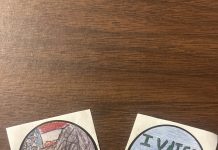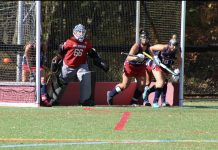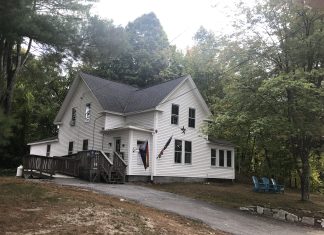With course registration passing and students considering what classes to take, one class they should think about taking is LGBTQ Politics, taught by NEC’s newest faculty member, Megan Osterbur.
Osterbur has a strong background in LGBTQ politics, including her dissertation along with scholarship based on queer politics.
“I like to teach classes I am really passionate about. My research is primarily in LGBTQ Politics, so starting from before my dissertation in grad school my scholarship was on queer politics, LGBTQ movements,” Osterbur said.
“This is where my passion lies. I think my colleagues would agree with this notion that you are best at teaching the stuff you most care about.”
The course will be offered in the spring as a topics class that discusses the history behind the LGBTQ movement, while also focusing on queer politics both in the U.S. and abroad. Osterbur thinks it is necessary to bring in both perspectives.
“The course is going to be necessarily some history of the movement: where did the modern queer civil rights movement get started and where has it gone, how it has evolved over time. But we will also focus on contemporary research on queer politics both in the U.S. and abroad.”
“I think it’s helpful to see the U.S.’s position in the world, which might not always be what we think it is,” she continued. “And when it comes to marginalized people it’s not often where we, as Americans, think: we are always at the top of everything.”
The timing of the course mirrors what is currently going on in the world and the media. LGBTQ issues are spoken about frequently and this class can help give a better understanding to students of what it all means for the movement.
“I think now is a good time to teach it because LGBTQ Politics is about a specific movement, but also a lens to think more broadly about social movements in general, about how policies affect how specific groups are made, how the broader side reacts to marginalized people, and there is certainly a fair amount of fodder in the news about all those things,” Osterbur said.
Students will also learn about the idea and history of social movements and how they can be engaged civically.
“My goal is that students will learn from the class that social movements are always changing, and [how to get] involved in the right way that fits for them. Whether it be the LGBTQ movement itself or other movements because I really do think of this as a model for involvement and engagement.”
She continued, “I hope it spurs some form of activism in whatever way is appropriate for each student.”
One of the elements of the class is finding your own voice. Osterbur explains that students will also have a better lexicon for explaining the movement.
“I think a lot of misunderstanding comes from not having the right words. It’s not a vocab class” she jokingly said, “but students will have a better way to discuss their views and especially discuss their views around sexuality, gender and identity because that is often a delicate subject for people.”
“Having the right words to use could make a difference between developing an understanding with someone else or creating an enemy,” Osterbur said.
The LGBTQ: Politics course will help create a safe haven for students who have not found one yet here at NEC and create community by giving an understanding of what community means.
“To truly have community you need safe spaces, which mean multiple things at once: A place to express your ideas and change your ideas, where you feel welcomed, where your identity isn’t necessarily othered in the way that it can be more broadly,” Osterbur said.
“For LGBTQIA students, I think this class sends a strong message that not only are these students a part of our community, but they are a part of a community that is worthy of scholarship. It’s important to see and hear your voice in places other than the mass media.”
She also explains that this movement is worth teaching to others in courses such as this one and that people have the passion to spread the movement to others.
“To know that your identity is something that other people care about enough to study. Identifiers and non-identifiers a like, can provide the reassurance that you’re not alone and that your identity is more pervasive than maybe you think it is.”
Being at a liberal arts school we have a free space to explore and expand our knowledge. Offering a course to students on topics such as LGBTQ Politics can show students what it is like to be a part of the NEC community.
“If we don’t teach courses about the difficult topics then we’re not doing what a liberal arts college should do,” Osterbur said.
As fall semester comes to an end, students should consider taking LGBTQ: Politics for next semester as we welcome Megan Osterbur to the NEC community.





















Nice job on this, Kristen. I didn’t get to meet you last night at the meeting, but I look forward to reading more of your articles!